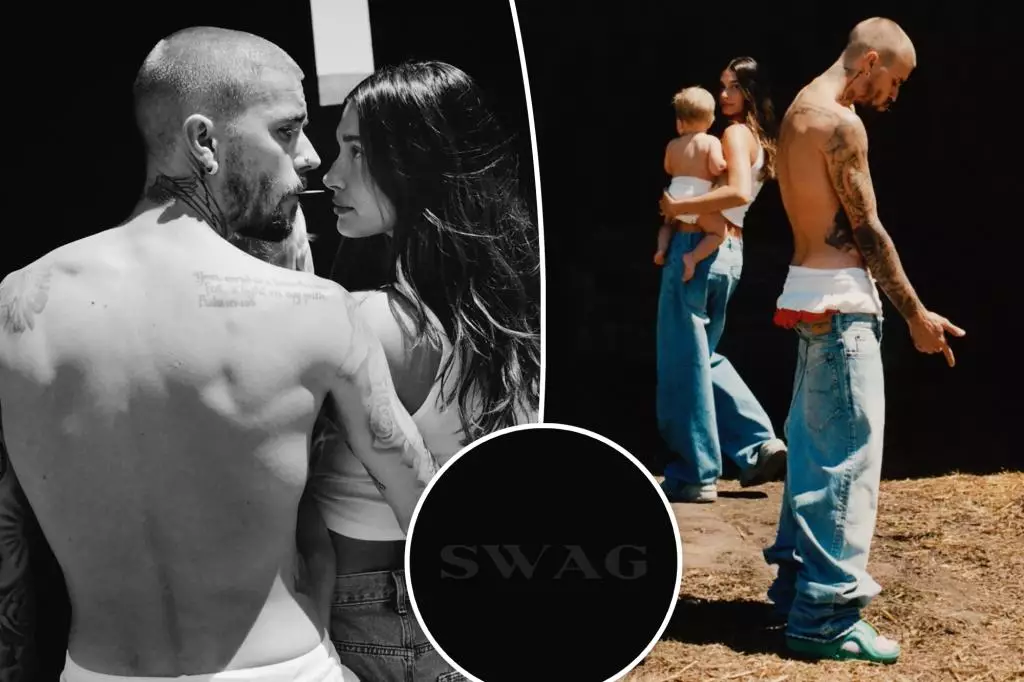Justin Bieber’s latest musical output, “Swag,” marks a pivotal moment in his career—one that goes beyond commercial success and touches the core of his personal life. By openly addressing his marital tensions, Bieber challenges the often superficial narrative surrounding celebrity relationships. Instead of hiding behind a sanitized image, he chooses vulnerability, transforming pain and uncertainty into art. This openness is a bold move, particularly in an industry where many prefer to conceal hardships, fearing tarnishing their brand. Bieber demonstrates that genuine storytelling not only resonates with fans but also signifies personal maturity. We are compelled to recognize that even those who seem to have it all—fame, wealth, adoration—wrestle with complex emotional battles. Bieber’s candor invites a shift away from superficiality, encouraging public figures to embrace authenticity over curated perfection.
The Complexity of Love in the Public Eye
Bieber’s candid lyrics reveal the turbulent realities of marriage, especially under relentless scrutiny. Lines like “Girl, we better stop before we say some s**t” and confessions of “testing patience” paint a picture of two people fighting to maintain a bond amid external pressures. The song “Walking Away” captures the internal conflict—balancing commitment with vulnerability, and the struggle to preserve affection when faced with adversity. Bieber’s depiction of trying to hold onto love amidst “growing pains” is striking; it exposes the raw, often unglamorous side of long-term relationships. His promise “Baby, I ain’t walking away” demonstrates resilience, yet the nuanced honesty suggests that love is a constant negotiation, fraught with setbacks but driven by deep care. The narrative underscores that maintaining a marriage requires ongoing effort and forgiveness, and that even celebrities are not immune to relational struggles.
The Myth of Perfection and the Power of Authenticity
In a culture obsessed with perfection, Bieber’s willingness to lay bare his imperfections is both refreshing and courageous. The song “Daisies,” with its lyrical pondering about love’s sincerity, embodies this candidness. Bieber acknowledges doubts and fears—“Head is spinnin’, and it don’t know when to stop”—which many listeners can relate to, regardless of their social status. His dialogue about respecting boundaries and needing grace signals a shift in the narrative surrounding celebrity relationships. It’s revealing that he openly discusses the possibility of taking time apart, reflecting a mature understanding that love necessitates patience and understanding. This stance champions the notion that authenticity and emotional transparency are strength, not weakness. Bieber challenges his fans to rethink their expectations of perfection in personal relationships, reminding us that vulnerability is the foundation of true intimacy.
Balancing Public Life and Private Reality
Justin Bieber’s relationship with Hailey, punctuated by vows of renewal and shared parenthood, remains under the intense glow of public interest. Their decision to release personal emotions through music and social media is a testament to their determination to stay authentic amidst relentless gossip and speculation. Hailey’s pointed social media post, mocking “losers” questioning their marriage, illustrates their conscious effort to control their narrative, defying media stories that aim to sow discord. Yet, beneath the bravado we see glimpses of genuine love and commitment—showing that their union is more complex than rumors suggest. Bieber’s candid references to struggles, combined with his public declaration of devotion, highlight the internal tug-of-war between vulnerability and societal expectations. It underscores that even amidst the chaos of fame, genuine human connections can still be nurtured and protected.
Breaking the Silence: Personal Growth in the Limelight
Justin Bieber’s artistic vulnerability signals a significant evolution in his journey—not just as an artist, but as an individual. His openness about marriage, personal doubts, and the desire for grace indicates a deeper understanding of himself. It’s easy to dismiss his confessional style as mere marketing or public relations, but if one looks beyond the surface, it reveals a sincere attempt at self-reflection. Bieber is no longer just the teenage pop star; he is someone grappling with the complexities of adult life, trying to reconcile his past mistakes with a hope for better future. In this process, he challenges the cultural tendency to villainize publicly troubled figures, instead emphasizing that growth often involves acknowledging weaknesses and striving for betterment. Bieber’s transparency may serve as a template for others—celebrity or not—to face their own struggles with courage and honesty.

